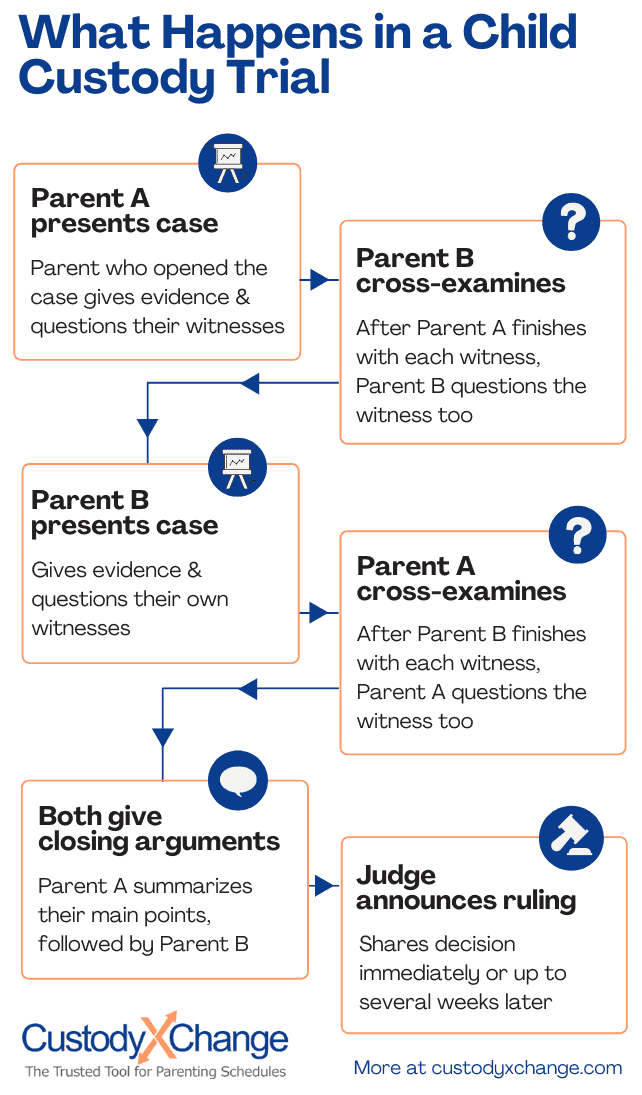Missouri Child Custody Trials
Missouri encourages parents to decide custody arrangements together, then file an uncontested case or settlement. When parents can't agree, the court holds a trial so a judge can decide custody. (There's no jury in family court.)
In a trial, each parent argues for the parenting plan, residential schedule and child support payment they want. The judge may order one parent's requests or different arrangements (often a middle ground between what each parent wants). The judge's decisions become court orders.
Trials typically begin six months to a year after parents open a case. They usually last a few hours or, in more complex cases, a few days.
Experts don't recommend representing yourself in a trial, as the law and court processes are complicated. Mistakes can negatively impact your case. If you can't afford to hire an attorney, you may be eligible for low-cost or free legal assistance.
What happens at a custody trial
First, each parent can make an opening statement to preview their position.
Then, each takes turns presenting evidence, which may involve explaining exhibits, questioning witnesses and giving their own testimony. Parents can challenge one another's evidence and question each other's witnesses.
If you have a lawyer, they'll give statements and present evidence for you. If you represent yourself, you'll do all this on your own. If your case has a guardian ad litem (GAL), they'll participate on the child's behalf.

When a child wants to share a custody preference with the court, the judge generally interviews them privately, with a court reporter present. Parents' lawyers might observe, depending on the judge's rules, but parents never do. In cases with a GAL or a custody evaluation, a report for the judge includes the child's preference.
The judge considers the child's opinion along with all the evidence and arguments, making final decisions based on what's best for the child. Often, the judge announces their decisions immediately or after a short break. However, in complex cases, they might take a few days or even weeks.
Preparing for a trial
If you're representing yourself, get familiar with your court's rules and how Missouri judges decide what's in a child's best interests. Check out Missouri's resources for self-represented parents, including the required Litigant Awareness Program.
If you have a lawyer, respond promptly to their requests and listen to their advice. Be honest with them so they can best represent you.
Most judges require a pre-trial conference, in which parents and their lawyers (if they have them) meet with the judge to discuss trial procedures and disputed issues. This is the final step before trial; beforehand, parents spend months preparing evidence and conducting discovery.
Evidence (exhibits and witnesses)
Start gathering evidence to support your position as early as possible.
The specific evidence you need depends on your case, but it should show how you meet your child's needs and support their best interests. You may need to:
- Prove your claims about the other parent
- Disprove claims made about you by the other parent
- Challenge the report from an evaluation or guardian ad litem investigation
Common evidence for a custody trial includes a parenting journal, photos, messages between parents, family calendars and official records (medical, school, criminal, etc.). These are called exhibits.
Witness testimony is also common evidence.
Lay witnesses are people who know the family (e.g., parents themselves, relatives, friends, child care providers, personal physicians). They can testify in person and through character reference letters to what they have personally observed.
Parents can also hire expert witnesses (e.g., child psychologists) to offer professional opinions.
Discovery
Discovery — sometimes called document exchange — is the process of sharing information and evidence with the other parent so you can both prepare for trial.
It starts when the respondent files their answer with the court and continues until a few weeks before trial.
Through court filings, parents request documents and other information from each other. Parents can also request to depose each other's witnesses (i.e., interview them under oath). Failure to comply with discovery requests can be considered contempt of court.
Trial tips
- Ask the court clerk about your court's procedures and your judge's rules.
- Observe a hearing with your judge, if possible.
- Dress professionally.
- Arrive early to find parking, go through security and locate the courtroom.
- Only bring your children if they're being interviewed that day.
- Friends and family can attend, but don't bring new romantic partners.
- Refer to the judge as "Your Honor."
- Show respect to everyone, and never interrupt.
- Ask for clarification if you don't understand something.
- When speaking, take your time, but don't ramble or go off topic.
- Answer questions directly, and only provide explanations when prompted.
- Don't lie or provide misleading information.
Using technology for your trial
Custody trials require serious organization.
You may need to propose residential schedules, suggest a parenting plan, show messages from the other parent and more.
The Custody X Change app lets you create and manage all of these elements in one place.

You can customize this to fit your situation with Custody X Change.
With residential calendars you can customize, a parenting plan template, printable parent-to-parent messaging and beyond, it helps you prepare for every step of your case.
Take advantage of custody technology to get what's best for your children.
